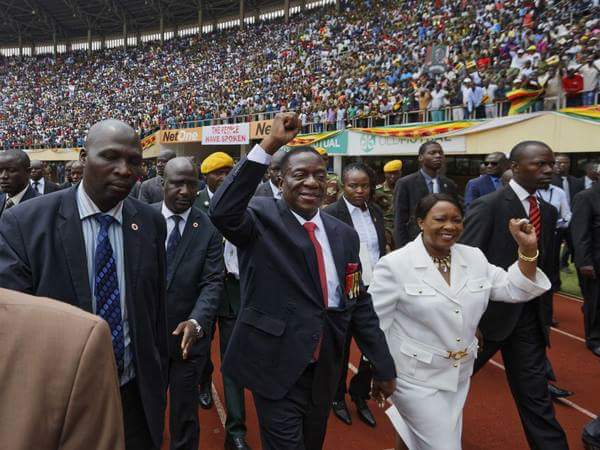By Farai Chirimumimba
Emmerson Mnangagwa was recently all over social media telling everyone who cares to listens the achievements that his government has made since taking over on 24 November 2017. But with his administration reaching its 100-day in office on Sunday 4 March, what has it actually achieved?
It has been implementing his inauguration address which contained to do list. But assembling a list of the most important 100 things that the government has done since it was elevated through a military coup shows that all is not quite as straightforward as Mnangagwa implies. While the inauguration address has provided a reliable roadmap in many respects, in others the government has diverted quite strikingly from what was on offer to the populace last November.
And, even through Mnangagwa’s government has enjoyed a relatively benign political climate, with the main opposition MDC-T in disarray, its record since November also reveals quite a lot about its weaknesses.
Mnangagwa stood for fighting corruption that is costing the country upwards of US$4 billion annually in lost revenue-y far the most important statement from government since taking over. But alias Generation 40 (G40) alleged members who supported the former president Robert Mugabe such as former finance minister Ignatius Chombo, former Tourism and Hospitality minister Walter Mzembi, former Energy minister Samuel Udenge among others have been arrested.
Sadly Team Lacoste members that cultivated Mnangagwa to power are loose with pressure mounting for the Mnangagwa to act on Obert Mpofu currently Home Affairs and Cultural Heritage minister who superintended the mines ministry when the alleged US$15 billion in diamonds revenue was lost.
Resuscitating the economy has been another priority. Mnangagwa has been around the region and as far as the Davos meeting in Switzerland selling the new dispensation economic reforms which are just talk without any concrete practical action on the ground. Zimbabwe is ranked 159 among 190 economies in the easy of doing business. Mnangagwa’s government has to act on fostering regulatory environment conducive to business operations and put in place stronger protection of property rights. Government should work to reduce company registration period and the bureaucracy associated with the need for multiple licenses from several ministries to operate a business.
The amending of the Companies Act so as to stimulate local and international investment and improve ease of doing business is noble but taking forever to implement as it has been on the cards for a long time. Formation and registration of companies remains complex and there is inadequacy of laws to act on poor corporate governance in companies. However, the revamping of the Deeds department to enable online deeds search and to update the companies’ database is encouraging as it will stimulate local and foreign investment due to efficient access to information.
All of this was in Mnangagwa’s inauguration speech. But the speech was woefully unspecific on the detail of where the resources to turnaround the economy would come from, and how it intends to service its unsustainable domestic and foreign debt of about US$13 billion to encourage new debt capital flow. With long standing external arrears, foreign financing has been scarce, large fiscal deficits are lately being financed through domestic borrowing that crowd out productive sector borrowing. The 100-day audit is dominated by grim austerity measures outside the government big spenders like the executive that will impact on the living standards of the already suffering millions.
Even though the government has been in power for just more than three months, it has already had to postpone or shelve major initiatives. Ministers have their own explanations, although it is embarrassing that proposals such as the dualisation of the Beitbridge-Harare road which links Sub-Sahara’s busiest inland border post with the rest of Africa, rail modernisation and the digitalisation program of the airwaves which are an important part to economic development, have now taken a back seat.
As the 100-days audit shows, in some respects the government has been constrained by parliamentary weakness. Ministers in most instances fail to show up for question and answers sessions and some refuse to subject themselves to parliamentary committees for accountability. Furthermore, ministers fail to submit annual reports of state owned companies under their wins and nothing is done by parliament to correct these intentional diversions.
The government is also taking its time over repealing some restrictive sections of the dreaded Public Order and Security (POSA) Act, Access to Information and Protection of Privacy (AIPPA) Act and the Broadcasting Services Act all which infringe on the freedom of expression which does not ogres well with the ease of doing business.
The 100-day audit is revealing because it contains measures that would never have been accomplished with the prescribed period such as amending legislations and finding a partner for struggling Air Zimbabwe saddled with over US$300 debt. Although last week Mnangagwa received from South Africa’s Transnet 157 wagons, seven locomotives and seven coaches for the National Railways of Zimbabwe (NRZ), marking a step towards the country’s revival of the railway system and the economy, NRZ has to work hard to win back business trust through revamping its dilapidated rail network and speed up delivery of consignments. All in all the first 100-days have failed to leave up to the billing that characterised the belief in the inauguration speech. However, judging a whole government in 100-days may not be fair because most activities require a timeframe beyond this to materialise.
